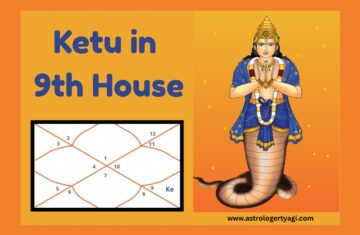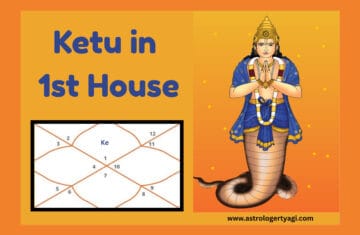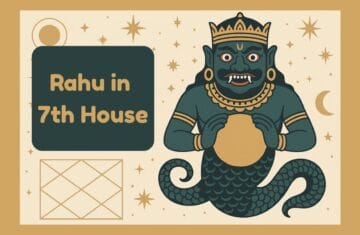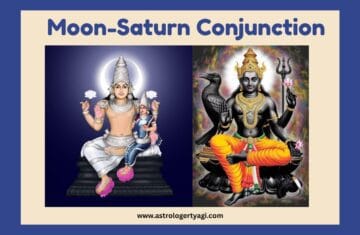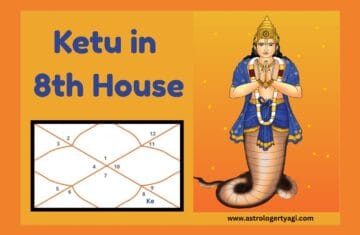1. Introduction
Vedic Astrology, an ancient science of self-discovery, interprets the celestial dance of planets and their profound influence on human lives. Central to this intricate system are planetary conjunctions – when two or more planets align in a single zodiac sign. These cosmic meetings create unique energetic fusions, shaping an individual’s destiny, personality, and life experiences. Among the myriad planetary pairings, the conjunction of Saturn and Ketu stands out as a particularly potent and often challenging combination, signifying a period of significant karmic reckoning and profound transformation.

2. Understanding Saturn (Shani) in Astrology
Saturn, known as Shani in Vedic astrology, is arguably the most feared and misunderstood planet. Often depicted as the stern taskmaster, Saturn represents discipline, hard work, responsibility, limitations, delays, and detachment. It is the planet of karma, delivering the fruits of past actions, both good and bad. Saturn’s lessons are often learned through struggle and hardship, but ultimately lead to profound maturity, wisdom, and resilience. It governs our career, social standing, structure, and our ability to face reality.
3. Understanding Ketu (South Node of the Moon) in Astrology
Ketu, the South Node of the Moon, is a mystical and highly spiritual entity in Vedic astrology. Unlike the visible planets, Ketu is a shadow planet, a mathematical point in the lunar orbit. It represents past life karma, liberation, detachment, spiritual pursuits, intuition, and sometimes, a sense of loss or incompleteness in the material world. Ketu is about letting go, dissolving attachments, and seeking higher truths. It can bring sudden and unexpected events, and its influence is often felt at a deep, subconscious level.
4. Saturn and Ketu Conjunction
The conjunction of Saturn and Ketu is a powerful and complex astrological alignment. It brings together the restrictive, karmic energy of Saturn with the detached, past-life influence of Ketu. This combination often signifies a period where an individual is forced to confront and resolve deep-seated karmic patterns, particularly those related to responsibility, discipline, and material attachments.
The core dynamics revolve around:
- Karmic Lessons and Release: This conjunction strongly indicates the culmination of past life karma. Saturn, the dispenser of karma, and Ketu, the significator of past life unresolved issues, work together to bring these matters to the forefront for resolution and release. There’s a strong urge to sever ties with things that are no longer serving one’s spiritual growth.
- Detachment and Austerity: Ketu’s influence enhances Saturn’s inherent detachment. This can lead to a period of withdrawal from worldly affairs, a questioning of material desires, and a greater inclination towards spiritual or philosophical pursuits. There might be a sense of being an outsider or feeling isolated from conventional societal norms.
- Renunciation and Discipline: The disciplined nature of Saturn combined with Ketu’s renouncing qualities can foster a strong sense of self-control and austerity. Individuals might voluntarily embrace a simpler lifestyle or dedicate themselves to rigorous spiritual practices.
- Structural Breakdown for Spiritual Growth: Saturn builds structures, while Ketu dismantles them for higher purposes. This conjunction can lead to the breaking down of old structures, beliefs, or even relationships that are no longer aligned with one’s karmic path. While this can be challenging, it ultimately paves the way for spiritual evolution.
The Closeness Factor: Degrees and Orb of Conjunction
The intensity and specific manifestation of the Saturn and Ketu conjunction are heavily influenced by their exact degree of closeness (orb).
- Tight Conjunction (within 1-3 degrees): When Saturn and Ketu are within a few degrees of each other, their energies are intensely merged. The effects will be pronounced and deeply felt, often leading to significant life changes and profound karmic experiences.
- Medium Conjunction (4-7 degrees): The influence is still strong but might manifest with slightly less immediate intensity, allowing for a more gradual integration of their combined energies.
- Wide Conjunction (beyond 7 degrees): While still a conjunction, the individual energies of Saturn and Ketu will be more distinct, and their combined effect might be less overwhelming, though still present.
Furthermore, the strength of the planets (exaltation, debilitation, friendly/enemy signs) and their placement in different houses will significantly modify the overall impact.
5. Positive Effects of Saturn and Ketu Conjunction
Despite its challenging reputation, the Saturn and Ketu conjunction can yield profound positive outcomes:
- Spiritual Awakening: This is a prime combination for deep spiritual realization, detachment from worldly illusions, and a strong inclination towards moksha (liberation).
- Profound Wisdom: Through the struggles and lessons Saturn imparts, combined with Ketu’s intuitive insights, individuals can gain profound wisdom and a clear understanding of life’s deeper truths.
- Discipline and Self-Mastery: The conjunction can instill incredible discipline, self-control, and the ability to overcome significant obstacles through sheer perseverance.
- Philanthropic Tendencies: With detachment from material gains, individuals might develop a strong desire to serve humanity and contribute to noble causes.
- Research and Occult Knowledge: This combination can foster a strong aptitude for research, metaphysics, and understanding hidden or esoteric knowledge.
- Sudden Breakthroughs (after initial struggle): While Saturn often delays, Ketu can bring sudden changes. After a period of concentrated effort and karmic clearing, unexpected breakthroughs, particularly in spiritual or detached pursuits, can occur.
6. Negative Effects of Saturn and Ketu Conjunction
The challenging aspects of this conjunction often manifest as:
- Isolation and Loneliness: The combined detachment can lead to feelings of isolation, social withdrawal, and difficulty forming deep emotional connections.
- Depression and Anxiety: The heavy and restrictive energy of Saturn, coupled with Ketu’s tendency for disillusionment, can sometimes manifest as periods of depression, anxiety, or a sense of hopelessness.
- Obstacles and Delays: Saturn’s inherent delays are often amplified, leading to frustration in career, relationships, and personal endeavors.
- Health Issues (especially related to bones, joints, and nervous system): Saturn governs bones and structure, while Ketu can indicate sudden issues. This conjunction might predispose individuals to chronic ailments or sudden health challenges.
- Financial Instability (due to detachment): A lack of focus on material accumulation due to Ketu’s detachment, combined with Saturn’s lessons in scarcity, can sometimes lead to financial struggles if not managed wisely.
- Sudden Breaks and Losses: Ketu’s tendency to sever ties can lead to unexpected losses in relationships, career, or possessions, forcing individuals to let go.
7. Effects of Saturn and Ketu Conjunction in Different Houses (Bhavas)
The house in which the Saturn-Ketu conjunction occurs significantly determines the area of life most affected.
- 1st House (Ascendant): A powerful karmic conjunction affecting personality, self-identity, and physical body. Can lead to a detached, serious, and philosophical demeanor. May experience early life struggles.
- 2nd House (Wealth, Family): Challenges related to family wealth, speech, and early education. Potential for detachment from material possessions or a disciplined approach to finances.
- 3rd House (Communication, Siblings): Difficulties in communication, relationship with siblings, or short journeys. May lead to a serious and insightful way of thinking and communicating.
- 4th House (Home, Mother, Happiness): Can indicate challenges related to home environment, mother’s health, or inner peace. May lead to detachment from domestic life or a desire for a secluded home.
- 5th House (Children, Creativity, Speculation): Challenges in matters of children (delays, detachment), creative pursuits, or speculative investments. Can foster a deep, philosophical approach to learning.
- 6th House (Debts, Enemies, Health): A challenging placement for health, but can provide strength to overcome enemies and manage debts with discipline. May lead to a detached approach to conflicts.
- 7th House (Marriage, Partnerships): Significant karmic lessons in relationships and partnerships. Can indicate delays, detachment, or unconventional relationships. May lead to a spiritual partner.
- 8th House (Longevity, Occult, Transformation): Highly transformative and spiritual conjunction. Can indicate research aptitude, interest in occult, and major life changes. May bring sudden events or inheritance.
- 9th House (Father, Dharma, Higher Learning): Challenges with father figure, or a detached approach to higher education and religious beliefs. Strong inclination towards spiritual philosophy and dharma.
- 10th House (Career, Public Image): Significant karmic lessons related to career, public reputation, and authority. Can indicate delays or unconventional career paths, but also a dedicated and disciplined approach.
- 11th House (Gains, Friends, Desires): Challenges in fulfilling desires or forming lasting friendships. Can indicate gains through unconventional means or a detached approach to material aspirations.
- 12th House (Losses, Spirituality, Moksha): A highly spiritual placement, leading to detachment from worldly desires and a strong path towards liberation (moksha). Can indicate foreign residence or service in secluded places.
8. Factors Modifying the Conjunction’s Effects
Several factors can significantly alter the impact of the Saturn and Ketu conjunction:
- Sign Placement: The zodiac sign in which the conjunction occurs drastically changes its manifestation. For instance, in an earthy sign like Capricorn, the discipline might be focused on practical achievements, while in a watery sign like Pisces, it could lead to deep spiritual introspection.
- House Placement: As discussed above, the house dictates the life area affected.
- Aspects from other Planets: Benefic aspects (e.g., from Jupiter) can mitigate negative effects and enhance positive ones, while malefic aspects (e.g., from Mars) can intensify challenges.
- Strength of Saturn and Ketu: If Saturn or Ketu are strong in the birth chart (exalted, in own sign, or vargottama), their effects will be more pronounced, both positive and negative.
- Natal Chart as a Whole: The overall strength of the chart, the ascendant lord, and the dashas (planetary periods) currently running will also play a crucial role.
Suggestion: Moon and Venus Conjunction
9. The Other End of the Axis: Rahu’s Indirect Influence
It’s crucial to remember that Ketu is always opposite Rahu (North Node of the Moon). Therefore, when Saturn conjuncts Ketu, Rahu will be aspecting Saturn. Rahu represents worldly desires, ambition, and expansion. This creates a tension where the detachment and karmic release of Saturn-Ketu are constantly influenced by Rahu’s pull towards material indulgence and worldly desires. This dynamic creates a push-pull effect, where the individual is learning to navigate the balance between detachment and engagement with the material world.
Associated Yogas and Special Combinations
The Saturn-Ketu conjunction can sometimes form part of larger yogas (planetary combinations) which further modify its effects:
- Pravrajya Yoga: If other renunciate planets like Jupiter or Mars also aspect or are connected to this conjunction in the 12th house, it can indicate a strong inclination towards asceticism or spiritual renunciation.
- Sanyasa Yoga: In specific conditions involving strong dharma trikona houses (1st, 5th, 9th), this conjunction can contribute to a yoga for spiritual enlightenment or even renunciation of worldly life.
- Vish Yoga: This is a classical combination often associated with Saturn and Moon, but a strong influence of Ketu can sometimes contribute to a similar energy of melancholic or challenging experiences, leading to profound transformation.
10. Timing the Effects: Saturn-Ketu Conjunction in Dasha Periods
The effects of the Saturn-Ketu conjunction are most intensely felt during their respective Dasha (planetary period) and Antardasha (sub-period) periods:
- Saturn Dasha/Antardasha: During Saturn’s periods, the themes of discipline, hard work, responsibility, and karmic reckoning will be prominent. If the conjunction is strong, these themes will be deeply intertwined with Ketu’s detachment and past-life influences.
- Ketu Dasha/Antardasha: Ketu’s periods bring forth themes of liberation, detachment, spiritual pursuits, and unexpected events. The conjunction with Saturn will emphasize the karmic lessons and the need for disciplined letting go.
- Dasha of the Lord of the Conjunction House: The planet ruling the zodiac sign where the conjunction occurs will also activate its effects during its Dasha.
11. Transit of Planets Over Saturn-Ketu Conjunction
Transiting planets, particularly slow-moving ones like Jupiter and Saturn, crossing over the natal Saturn-Ketu conjunction can trigger significant events and intensify the conjunction’s themes:
- Saturn Transit: When transiting Saturn aspects or conjuncts the natal Saturn-Ketu, it marks a significant period of karmic lessons, discipline, and potentially challenging realignments.
- Jupiter Transit: A benefic transit of Jupiter can bring relief, wisdom, and opportunities for growth through the challenges presented by the conjunction. It can help integrate the lessons learned.
- Rahu/Ketu Transit: The transiting nodes (Rahu and Ketu) interacting with the natal Saturn-Ketu can create periods of intense karmic activation and significant life changes, often involving letting go of old patterns.
12. Remedies and Mitigating Measures for Saturn and Ketu Conjunction
While a challenging conjunction, there are several Vedic remedies to mitigate negative effects and harness the positive potential:
- Spiritual Practices: Deep spiritual practices like meditation, yoga, mindfulness, and chanting (especially Shiva or Ganesha mantras) are highly beneficial for Ketu and Saturn.
- Charity and Seva (Service): Offering selfless service to the less fortunate, especially to the elderly or disabled (ruled by Saturn), can alleviate karmic burdens.
- Discipline and Perseverance: Embracing discipline in daily life, fulfilling responsibilities, and working diligently can appease Saturn.
- Detachment and Non-Attachment: Consciously practicing detachment from material outcomes and emotional attachments helps align with Ketu’s energy.
- Donations to Temples/Spiritual Causes: Supporting spiritual institutions or donating to those pursuing spiritual paths can enhance Ketu’s positive influence.
- Fasting: Observing fasts on Saturdays (for Saturn) or on specific spiritual days can be helpful.
- Mantra Chanting:
- Om Sham Shanicharaya Namaha (Saturn Mantra)
- Om Ketave Namaha (Ketu Mantra)
- Gemstones (Consult an Astrologer): Blue Sapphire (for Saturn) and Cat’s Eye (for Ketu) are powerful gemstones, but must only be worn after careful consultation with a qualified astrologer as they can have strong adverse effects if not suitable.
- Vedic Rituals (Pujas and Homas): Performing specific pujas or Homas dedicated to Saturn and Ketu can help balance their energies.
13. Free Will vs. Destiny: Navigating the Saturn-Ketu Influence
The Saturn-Ketu conjunction strongly highlights the interplay between destiny (karma) and free will. While the conjunction indicates strong karmic patterns and predispositions, it does not imply absolute fate. The challenges presented are opportunities for growth and spiritual evolution. By consciously choosing to embrace discipline, practice detachment, and engage in spiritual practices, individuals can navigate the Saturn-Ketu influence with greater awareness and transform potential hardships into profound wisdom and liberation. It’s about responding to karmic lessons with mindful action rather than reactive despair.
Suggestion: Rahu and Venus Conjunction in Astrology
14. Conclusion
The Saturn and Ketu conjunction is a powerful astrological signature that marks a period of intense karmic clearing, spiritual awakening, and profound transformation. While it often brings challenges and necessitates detachment, its ultimate purpose is to guide individuals towards higher truths, inner liberation, and a deeper understanding of their spiritual path. By embracing discipline, practicing detachment, and engaging in conscious spiritual growth, one can effectively navigate the energies of this conjunction and emerge stronger, wiser, and more aligned with their true purpose.
15. FAQs
Q1: Is the Saturn-Ketu conjunction always bad?
No, it is not inherently “bad.” While it brings challenges and karmic lessons, it is a powerful catalyst for spiritual growth, detachment, wisdom, and liberation.
Q2: How long do the effects of Saturn-Ketu conjunction last?
The conjunction’s effects are lifelong, shaping core aspects of the personality and destiny. However, their intensity will be most pronounced during relevant Dasha periods and transits.
Q3: Can remedies completely negate the effects of this conjunction?
Remedies cannot completely negate karmic influences, but they can significantly mitigate negative effects, provide strength to face challenges, and help one align with the positive potentials of the conjunction.
Q4: What career paths are suitable for individuals with a strong Saturn-Ketu conjunction? Careers involving research, spirituality, healing, social service, law, or those requiring discipline and a detached approach can be suitable.
Q5: How does this conjunction affect relationships?
It can bring challenges of detachment, delays, or unconventional relationships. The individual might seek a partner with whom they can share a spiritual or philosophical bond rather than purely material attachment.


